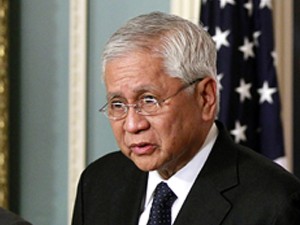Rules-based approach to sea row
MANILA, Philippines—Amid the worsening row in the South China Sea, the Philippines has called on the European Union and members of the Association of South East Asian Nation (Asean) to support its efforts to promote a rules-based approach in the settlement of maritime disputes in the region.
In a statement issued by the Department of Foreign Affairs, Foreign Secretary Albert Del Rosario spoke before foreign ministers at the 20th Asean-EU Ministerial Meeting in Brussels and said the submission by the Philippines of its claim to arbitration under the United Nations Convention on the Law of the Sea (Unclos) is a manifestation of its commitment toward peaceful settlement of disputes in accordance with international law.
“Lady Catherine Ashton, High Representative of the EU for Foreign Affairs and Security Policy, echoed Secretary Del Rosario’s call and affirmed EU’s support for the right of claimants to seek resolution of disputes in accordance with international law, including through legal dispute settlement mechanisms,” the DFA said.
No unilateral action
The DFA said Ashton had urged against unilateral attempts by any party to assert its claims through the use of intimidation, coercion or force.
Article continues after this advertisementThe foreign ministers present at the meeting endorsed the call of Ashton and enjoined parties to seriously implement the Declaration on the Conduct of Parties in the South China Sea toward the early conclusion of a Code of Conduct in the South China Sea.
Article continues after this advertisementChina and the Philippines are caught in a territorial dispute over areas in the South China Sea which the former claims in its entirety including portions of the Philippines’ 200-nautical mile exclusive economic zone (EEZ).
Tensions have escalated in the region after a standoff in April 2012 between Chinese and Philippine vessels in the Scarborough Shoal.
New tensions
In January, new tensions arose after China’s Hainan province began implementing a new fisheries regulation banning foreign ships from conducting fishing or survey activities in South China Sea without permission from Chinese regional authorities.
To settle the dispute, the Philippines filed a case before the UN Permanent Court of Arbitration against China and was supposed to submit its written arguments last March. But China refused to participate in the arbitration proceedings.
The 20th Asean-EU Ministerial Meeting last week drew the participation of foreign ministers from 10 Asean and 28 EU member states.
Meanwhile, the European Union has announced that Ashton would be in a Manila for a two-day visit next week to boost trade relations between the country and the 28 EU member states and discuss the escalating tensions in the South China Sea.
Ashton will be in town from July 28 to 29, EU ambassador to the Philippines Guy Ledoux said during his recent visit to the Inquirer.
He said this would the first time a top EU official will visit the country as the strong politico-economic union in Europe begins to take a keen interest in investing more in the country.
Here for Sona
The arrival of Ashton, also the vice president of the European Commission, will coincide with President Aquino’s scheduled fifth State of the Nation Address (Sona).
On July 29, Ashton will make a courtesy call on President Aquino and meet Foreign Secretary Del Rosario for an exchange of views on EU-Philippines relations.
“She intends to complete her visit to each country in the Asean,” Ledoux said in a recent meeting with Inquirer publisher Raul Pangalangan and chair Marixi R. Prieto.
Ashton earlier visited Thailand and Burma (Myanmar).
“The economy is booming here. We are very interested in the exports of the Philippines to Europe which last year rose by 20 percent,” Ledoux said.
One of the things she plans to discuss with Philippine officials is the new preferential trading scheme which would allow exports of the Philippines to Europe to have a lesser tariff.
European position
Ledoux said the scheme, which might take effect soon once approved by the European parliament, would benefit sectors exporting textiles and fish products like tuna.
The role and position of the European Union in the settlement of the disputes in the West Philippine Sea (South China Sea) will likewise be discussed in the meeting with Del Rosario.
While the European Union has never taken sides in the arbitration case filed by the Philippines against China’s sweeping territorial claims in the West Philippine Sea, it expressed willingness to help in the settlement of the maritime dispute.
“But we are open to share our European experience on maritime issues,” he said, citing the example of the delineation of the Scotland and Norway’s maritime borders.
RELATED STORIES
Palace welcomes US Senate resolution backing PH on sea dispute
Int’l group backs PH in sea dispute with China
For comprehensive coverage, in-depth analysis, visit our special page for West Philippine Sea updates. Stay informed with articles, videos, and expert opinions.
